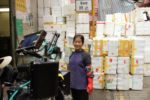
In our video crew booking division, we get our fair share of stories from clients shooting around the globe: trials, tribulations and triumphs alike. Recently we had our own Joe Maiella, VP of Camera Crews Worldwide, chat with David Wolfson, a veteran producer of domestic and international shoots, about David’s experience on a Hong Kong shoot. The discussion seemed to come down to one overriding message when it comes to international filming: stay flexible.
Joe Maiella: Can you give us a little background on your Hong Kong shoot, how it ended up there?
David Wolfson: B-Reel / LA was hired by Leo Burnett and Samsung to create a short film for a presentation at the 2013 CES conference in Las Vegas. The film was to live online as well. The purpose of the film was to tell a story about sharing, showcasing the many different ways people connect throughout the globe. From something as simple as a meal, to things more substantial like the sun or sources of water. The story only worked if we could manage to show scenes that felt global – without cheating locations in Los Angeles to make them feel like other places.
We sat with a map of the world and picked nearly 20 cities to tell our stories. We sent out 2 principal crews and hired splinter crews in other places to film various scenes. Hong Kong was chosen for a few reasons. We needed an Asian backdrop, but we wanted that backdrop to allow for a nice mix of old and new. What better place to offer textures from the most modern to the most traditional than Hong Kong?
JM: What did you see as the principal challenges in shooting overseas, and especially within China or Hong Kong?
DW: On a job of this scope, the challenges are many. We did not have the schedule or resources to hire service companies in each place and had to find a way to shoot with as small a crew as possible. Our schedule also did not allow for extensive location scouting or casting. So, we needed unit management that had a clever, outside-the-box way of handling production. Of course, whenever you shoot outside the US, you have the normal obstacles of language barrier – as well, it’s about finding like mindsets with people who can get to know your system, while you respect their system.
JM: What did you do to prepare for a successful shoot and minimize surprises?
DW: Ha. Ummm… Given our schedule, minimizing surprises was a luxury we didn’t have. We sent out a creative deck with the scenes and shots we were hoping to get, but in the end, it was more like, “Let’s throw everyone in a van and go figure it out.” By the time we arrived in HK, our unit team had compiled locations and cast for 80% of our scenes. For the rest we sort of “winged it,” but it was always an organized version of chaos. This is where the personalities of the local staff could have made or broken our job. I am pleased to say, our team rolled with changes and normal (and even some not so normal) production issues with aplomb.
JW: What did you find on site versus what you were prepared to find?
DW: Having been to HK before on a big production, there weren’t too many surprises in that regard. Everything was pretty much as expected. If anything, I walked away amazed at what can be done working outside the normal production service model. Our streamlined staff almost made it easier to get things done. There weren’t levels upon levels of people to get things accomplished and in the end, it made the decision of whether something was doable or not a lot more immediate.
JM: How did you manage through the challenges that may have been unanticipated?
DW: Patience. No other way to say it. I don’t mean patience dealing with the local hires, but simply patience dealing with the challenges that go with shooting on foreign soil, where rules and regulations dictate a procedure. And I am pleased to say we had that patience and were surrounded by a group of extraordinary problem solvers.
JM: How did your budget for the shoot stack up against the actuals when the shoot was complete?
DW: Spot on. Any overages that were incurred would have been things driven by production, but in the end, they knew how much we had to spend and were very resourceful keeping things within that range. So, I was very pleased where things ended up financially.
JM: What lessons did you learn? And what do you consider to be the most significant factor to the success of your shoot?
DW: Having shot all around the globe, it’s hard to pinpoint specific learning experience. I will say that I learned you can do just as good of work with a small, “run-and-gun” crew as you can with a 50-man crew. Moreover, I think there are things we accomplished successfully that were ONLY doable because we were such a small crew. HK is not a city built for filming. They have strict guidelines and at times things felt like they would never happen. But, again, with the right crew on the ground, there was always a solution.
JM: What would be your advice to those who plan a shoot in Hong Kong, or other international sites?
DW: Adapt. You can go into any city with a plan, but you have to be cognizant that there will be curveballs and rather than trying to push your will, you need to adapt to that city’s way of doing things and find a solution that gets you to your end goal. If you try to shove the circle through the square you will never make it. But, if you redesign the shapes, you often find you end up with something just as good, if not better.
Stay light on your feet and never let emotion get in the way. If you have the right core group around you, there is virtually nothing you can’t achieve.
